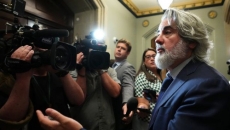Though the wildfire season in B.C. this year has been less intense than last year's record destruction, drought conditions persist in many regions and the situation could worsen, Emergency Minister Bowinn Ma has warned.
Ma told a news conference Wednesday that the province had spent $483 million on wildfire suppression this fiscal year, compared to $556 million at the same time last year.
"Our position today compared to last year will of course be a little bit of luck around the weather," Ma said. "That being said, we learned a lot of lessons from the 2023 wildfire season."
The province has so far avoided mass evacuations like those seen in the Okanagan last summer, she said, but "while evacuation numbers are low and the southern half of the province is seeing some current relief, we are again still very much in the core wildfire season."
More than 350 wildfires are burning across B.C., 18 properties have been ordered evacuated and 1,600 properties are on evacuation alert, meaning residents must be ready to leave at short notice.
Two fires are categorized as "wildfires of note," meaning they are highly visible or a threat to people or property, after the Komonko Creek wildfire in southeastern B.C. lost the designation.
The remaining wildfires of note are the Shetland Creek fire north of Spences Bridge, which is now classified as "being held" within its current or predetermined perimeter, and the 2.5-square-kilometre Corya Creek fire in the northwest.
The Corya Creek fire is among the 29 per cent of the province's fires that the BC Wildfire Service classifies as burning out of control.
Forrest Tower with the wildfire service said Wednesday that firefighters had been "pretty fortunate with the weather conditions," enabling them to get many fires under control.
Tower said some parts of the province are still seeing hot and dry conditions, but crews have been dealing with smaller blazes and have been able to snuff them out more quickly and with less effort.
"In general, we are in a much different place than we were last season going into the fall," he said.
The latest bulletin from the service says the forecast for most of the province is pointing to cloudy skies with seasonal temperatures and light winds.
Areas in southern B.C. will see some rain, which will be heavier along the coast, with a chance of lightning in the southeast and on southern Vancouver Island.
A warming and drying trend is returning to the north, where bulletins about smoky skies have been issued for the Peace, Williston and Stuart-Nechako regions.
Resource Minister Nathan Cullen told Wednesday's briefing that although rain has provided relief in some parts of B.C., a quarter of the province is still at drought level four, meaning adverse economic and environmental impacts are likely. Drought conditions in other areas are even worse.
"We have a number of key regions, Bulkley Lakes, Upper Fraser West, Vancouver Island, that are at level five, which is the highest level we can have for drought," he said. "You put all that together, the rain certainly helps, but it shouldn't take down our vigilance at all."
Drought level five means adverse impacts are almost certain.
Cullen said the need to conserve water remains high.
"Aquifers don't recharge because of one or two rainfalls. They take time, and because we've had such a long drought over the last couple of years, a number of the regions in the province stay in these high elevated levels of drought simply because the aquifers haven't recharged," he said.
"We are still facing the possibility of restrictions in a number of places in the province, so we need to keep on our game."






